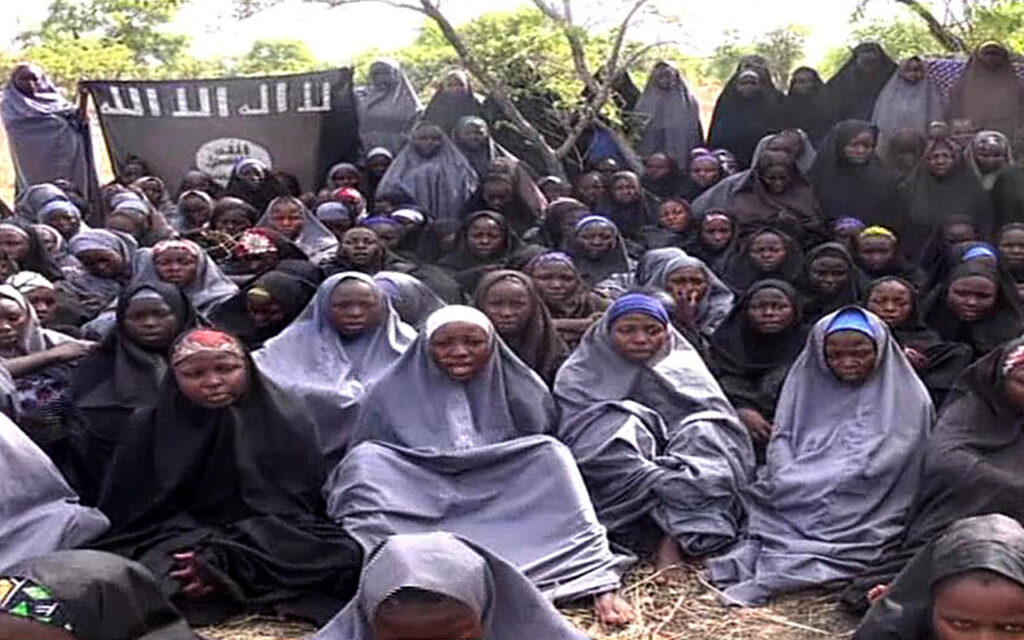Joy Bishara, Lydia Pogu and Mercy Paul were among 276 teenage girls who Boko Haram terrorists kidnapped from their school in April 2014 to start a broken new life deep in the forest of horror.
Eight years after, the three can smile at a future of value in a world of opportunities, having been lucky to jump off the ill-fated truck of the kidnappers on the night of the incident and ferried to the United States to further their education by Jubilee Campaign, a human rights group.

“I jumped not knowing if I would be able to walk or whether I would die,” Paul said in an interview with NBC upon her arrival at Canyonville Christian Academy, a college preparatory school in Oregon, US.
In 2021, Bishara earned a Bachelor’s degree in Social Works, Pogu graduated with a legal studies degree while Paul was on her journey to becoming a doctor.
Sadly, the same cannot be said of over 100 other girls who have been failed by President Muhammadu Buhari’s administration, with their lives derailed in continued captivity of the Islamic terrorist group, eight years after the abduction.
Data from the Bring Back Our Girls (BBOG) campaign shows that of 276 who were abducted, 57 escaped, 107 were released after negotiations between the insurgents and the government, and 112 remain missing or held captive.
Their parents, 20 of whom had died from heart-related conditions, have nothing to show for years of protests, vigils and pleas for the government to rescue their children from the terrorist den.
They are rather left with thoughts of their children’s new life reformed terrorist ideologies and memories largely reduced to the anniversary of their kidnap.
The number of those missing dropped to 109 last year after three of them returned home. Ruth Ngiladar Pogu and Hassana Adamu returned with two children they bore within the time they were in captivity. Saraya Musa Mutah was found wandering in the forest and they have since been reunited with their families.
The US human rights group in a statement last year blamed the government of former President Goodluck Jonathan for being slow to act and failing to prevent the attack at first. The group continues to call for the release, recovery and rehabilitation of the missing girls into society.
But pressure groups in Nigeria say rescue efforts have been sidestepped in the priorities of the government of President Muhammadu Buhari.
The BBOG accused the government of abandoning the girls when it should have redoubled the effort to secure their release. It also said their parents have not received reassurance from the government on whether there was still an active rescue operation or not.
“The lack of interest in upholding the dignity of human life has brought us to the footstool of global shame. We cannot continue to be a society where the poor are left to their own design. We, therefore, remind President Muhammadu Buhari of his solemn declaration in his 2015 inauguration speech that the fight against the terrorists cannot be said to be won until all our #ChibokGirls are back along with others in captivity,” the group said in a statement signed by five members including Aisha Yesufu, Oby Ezekwezili.
The International Crisis Group ranks the incidence as one of the most notorious insurgent attacks in the country, which has taken a toll on over one million children mainly in the northeast and in neighbouring countries including Cameroun, Niger, and Chad.
Children in Borno State are among the most affected by conflict and educationally disadvantaged in the world, with over 1,400 schools destroyed and 2,295 teachers killed across the northeast in protracted conflict, according to the United Nations Children Fund (UNICEF). At a point, children were used as human bombs including girls often under 15 years old and boys.
Despite the current government offering early hopes by driving some of the insurgents out of their strongholds, the ICG says Buhari still has failed to rescue the girls.
The Chibok girls are only considered just a small fraction of the thousands of children and women abducted by the insurgents as the scale of the toll became apparent with more captives liberated by the advancing troops.
It urged the government to stay keen on detailed documentation of all those seized over the years and account for them all including those missing.
Part of ICG’s recommendations to protect against attacks on schools and the abduction of students is for the government to increase military deployments and other security agencies to the north in a more efficient way. It wants the army to review its engagements countrywide, pull out personnel and resources from what is in excess police operations, and concentrate them on the northeast.
It also urged the government to investigate the security lapses that enabled the abductions and publish findings. The government should pledge to implement this committee’s recommendations. The committee should include women and others with specific knowledge and understanding of gender-sensitive aspects of the Boko Haram insurgency. The government also should publish the findings of the 2014 Ibrahim Sabo committee, which investigated the Chibok girls’ abduction, the ICG said.
As the 2023 election approaches and more actions sway towards politics, the conviction and disappointment are even higher that Nigeria has failed the girls and their parents.
More citizens are increasingly being failed in a renewed attack on the northwest grows – the Abuja-Kaduna train attack being the recent biggest attack. Growing as well as a public trust deficit in government and its ability to keep people safe.
